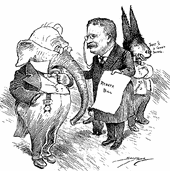Roosevelt & Reform

a political cartoon depicting president roosevelt
The presidential administrations of the 1890s and 1900s sought to continue the ideas of reform and "social justice" by prohibiting the corruption and favoritism that occurred in so many of the big corporations.
- The beginning of the 1900s was the Progressive Era, in which many movements to improve the country through government involvement and regulation were started. Mainly dealing with improving working conditions etc. for workers, moral issues such as prostitution and alcohol abuse, and generally improving the quality of life in America.
- Theodore Roosevelt, the "Republican Progressive" president, worked hard to change people's perceptions of working life in America from seeing the common man as being oppressed by the industry giants to a fair working environment.
- President Roosevelt's first message to Congress "included demands for federal supervision and regulation of all interstate corporations, for amendment of the Interstate Commerce Act to prohibit railroads from giving special rates to shippers" (Mayer).
- The Elkins Act in 1903 was aimed at stopping railroads from giving secret rebates to some of their shippers.
- The Hepburn Act in 1906 helped to strengthen the ICC and gave it more authority over the railroads.
- Many other acts were instituted to improve and regulate the other top industries in the United States.
